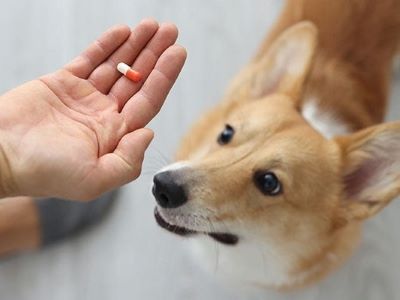Allergies are common in dogs. To treat those we give them different medicines, and antihistamines are one of them, but “What natural antihistamine is safe for dogs?”
In this blog, we are going to find out about antihistamines and what are the natural options for this as it is important to give our dogs safe medicines.
The goal is to keep our dogs healthy. So, without further ado let’s start exploring…

What Natural Antihistamine Is Safe for Dogs?
Just like us humans, our dogs can feel discomfort too due to allergies. Allergies happen when a dog’s immune system reacts too strongly to things like food, pollen, or dust mites.
This releases histamine in the body. Histamine gives dogs itchy skin, wheezing, coughing, and watery eyes. Antihistamines stop histamine so they can relieve symptoms of allergy[1]. Here are some allergic reactions:
- Pollen, dust, or mould can trigger allergies in dogs, causing symptoms like itching and sneezing.
- Some ingredients in their diet may lead to digestive issues, skin problems, or ear infections.
- Flea or tick bites can provoke allergic responses, leading to itching, swelling, or redness.
There are antihistamines just for dogs that need a prescription. However many dog owners want natural antihistamines instead because they don’t have synthetic chemicals or as many side effects. Let’s understand the safe natural antihistamines in detail:
1. Quercetin
Quercetin is found in various dog-friendly foods like apples, berries, and leafy greens. The dose depends on your dog’s size and weight.
It’s crucial to consult your vet for the right advice for your dog’s needs. Quercetin is normally safe, but some dogs may experience mild side effects such as upset stomach.
Always watch out for your dog closely when introducing a new supplement and consult your vet if you notice any unusual reactions. Quercetin acts as a natural antihistamine, helping to alleviate allergy symptoms.

Its anti-inflammatory properties can reduce itching, inflammation, and discomfort in dogs with allergies. Quercetin supplements or natural sources can be combined into your dog's diet, providing a balance in managing allergies[2].
2. Bromelain
Bromelain is an enzyme found in pineapples, especially in the stem and root. Fresh pineapple or bromelain supplements are potential sources for dogs.
For fresh pineapple, remove the tough centre and offer small, bite-sized pieces.
Bromelain supplements should be given according to your vet’s advice based on your dog’s size and health. While bromelain is normally safe, watch your dog for any signs of distress, such as vomiting or diarrhoea.
If worse reactions happen, talk to your vet quickly to understand the right next stage. Bromelain has anti-inflammatory effects, that’s why it is for dogs with allergies. It helps in reducing inflammation and swelling, increasing comfort.
If using fresh pineapple, ensure it's free from additives like sugar. Introduce slowly to check your dog's tolerance, then increase as per the comfort.
3. Omega-3 Fatty Acids
Omega-3 fatty acids are available in abundance in fish oil, found in fish like salmon, mackerel, and sardines[3]. Use according to your dog’s size and preference after consulting with your vet.
You can use fish oil pills or liquid supplements can be added to your dog’s food. Omega-3s promote healthy skin and coat, reducing itching and flakiness.
They support joint health, benefiting dogs with arthritis or mobility issues. Include fish oil into your dog's diet by adding it to their food. Start with a lower dosage and slowly increase as per the preference of your dog.

4. Stinging Nettle
You can also give dogs nettle supplements or make nettle tea from dried leaves. Make sure there’s nothing in it that could hurt your dog. Ask your vet how much to give your dog.
The right dose depends on your dog’s size and the type of nettle. Some dogs might be allergic to nettle. Start with a little bit and watch for reactions.
Nettle can affect the kidneys. So dogs with kidney problems should not have much nettle or maybe none at all.
5. Chinese Skullcap
Chinese Skullcap is a herb famous for its anti-inflammatory benefits, it is very useful in allergy. This helps in reducing histamine release and providing relief from itching and inflammation in dogs.
The dose varies on the dog’s size and condition. Always inform your vet about any continuing treatments or health issues before introducing Chinese Skullcap, and monitor your dog carefully.
6. L-Theanine
L-Theanine is found naturally in green tea. So giving dogs green tea can be a good source. There are also L-theanine supplements just for dogs. Ask your vet how much and how many times to give your dog. The amount depends on the size and type of the green tea.
L-Theanine helps dogs relax and feel less anxious. It makes the brain produce chemicals that make the body relax. But it does not make dogs sleepy. L-Theanine may help dogs that are stressed, anxious, or have behaviour issues.
Knowing where L-Theanine comes from, the right amount to give, and how it can calm dogs allows pet parents to try this option. It may help their dogs feel more relaxed and healthy.

7. Irish Moss
Irish moss has good nutrients that can help a dog’s immune system. It can be added to a dog’s food to help their health. To prepare Irish moss, soak it and rinse it well to remove any salt or other stuff added to it. Add a little bit to your dog’s meals.
Irish moss is generally safe but watch your dog closely. Make sure they don’t get diarrhoea or show signs of allergies. If your dog acts sick or seems unhealthy after eating Irish moss, consult with your vet.
Lifestyle Changes to Support Allergy Control
Besides medicines let’s see what lifestyle changes we need to make, to improve our dog’s health:
🐶Nutrition:
Take advice from your vet on identifying any specific foods that are affecting your dog. Common foods include some proteins, grains, or additives.
Consider switching your dog to hypoallergenic or limited-ingredient diets that eliminate potential allergens, improving stomach health.
Combine omega-3 fatty acids into their diet, either through fish oil or foods rich in these nutrients. This can help with skin allergies and promote a healthy coat.
🫧Grooming:
Regular baths with hypoallergenic shampoos can help remove allergens from your dog’s coat and skin. Follow your vet’s suggestions about how many times to bathe your dog.
Brush your dog regularly to reduce the pile of allergens, loose hair, and dander. This is especially important for breeds with thick or long coats. Also, clean your dog’s ears to prevent infections.
🏠Environment:
Vacuum and dust your home repeatedly to reduce the presence of allergens like dust mites, pollen, and mould. Use air purifiers to improve air quality.

Provide your dog with hypoallergenic bedding and wash it regularly. This reduces the risk of allergens piling in their sleeping area. During peak allergy seasons, reduce outdoor exposure.
Clean your dog’s paws after walks to minimize the transfer of outdoor allergens into your home. Regularly check in with your vet to monitor your dog’s allergy symptoms and adjust their management plan as needed.
When to Consult With the Vet?
It’s important to talk to your vet if your dog has allergies.
- See your vet if your dog is acting weird, scratching a lot, has red skin, or eats less. Also, see your vet if your dog has ongoing allergy problems like infections in their ears or stomach issues.
- Get veterinary help right away if symptoms are new or very bad. The vet can figure out why your dog has allergies and give good treatment fast.
- Your vet may test your dog to find out what things they are allergic to. This could be blood tests or skin tests.
- If your vet thinks it’s food allergies, they may put your dog on a special diet to learn which ingredient causes problems.
- For other allergies, the vet can help figure out what things like pollen or dust make your dog react. The vet will look at your dog’s full health history before prescribing allergy medicines.
This helps make sure the medicines are safe and work well with any other medicines your dog takes. Vets give treatment plans designed for each unique dog.
FAQs
What Human Antihistamine Is OK for Dogs?
Antihistamines with the active ingredients of diphenhydramine, chlorpheniramine, cetirizine, clemastine or loratadine are usually safe for most healthy adult dogs. Hydroxyzine is another dog-safe antihistamine and one of the most effective available, but it’s only available on prescription.
What Natural Antihistamine Is Safe for Dogs?
his herbal tea has been used in traditional medicine and is now being studied as an effective treatment against allergies. Nettle leaf tea contains natural antihistamines which can provide relief from itching and other allergy symptoms.
What Ingredient in Antihistamines Is Bad for Dogs?
OTC antihistamine preparations may contain other ingredients such as decongestants that are not safe for dogs. Read the label carefully to ensure that the product only contains antihistamines. Check with your veterinary healthcare team to make sure that the antihistamine you have is suitable for your dog.
What Fruit Is a Natural Antihistamine?
Bromelain. Bromelain is the natural plant enzyme found in pineapple that is said to possess antihistamine properties. While pineapple is a nutrient-dense and delicious fruit, this anti-histamine food may be more effective for histamine intolerance when taken in higher amounts, as found in supplement form.
What Antihistamine Can I Give My Dog and How Much?
According to the Merck Veterinary Manual, the standard dose for Benadryl® is 2–4 milligrams per kilogram of body weight, or 0.9–1.8 milligrams (mg) of Benadryl® per pound. Therefore, a simple and practical dose is 1 mg of Benadryl® per pound of your dog’s weight, given two to three times a day.
Conclusion
In conclusion “What natural antihistamine is safe for dogs?” We explored natural antihistamine options for dog’s allergies.
These options included Quercetin, Bromelain, Stinging Nettle, and Irish Moss. Always use these options after consulting with the vet. They will guide you as per your dog’s breed, size and need.
Watch out for any sign of distress after giving them antihistamines and quickly check with the vet if you find anything. After all, a healthy is a happy dog!
Reference:
- Professional, C. C. M. (n.d.). Antihistamines | Cleveland Clinic
- Quercetin and Its Anti-Allergic Immune Response | NIH
- Professional, C. C. M. (n.d.-b). Omega-3 fatty acids | Cleveland Clinic



